Archive for October, 2013
A dieci anni dalla “Rivoluzione delle rose” la Georgia volta pagina: finisce l’era Saakashvili. Il Paese caucasico diventa contemporaneamente una repubblica parlamentare per l’entrata in vigore della riforma costituzionale del 2010. 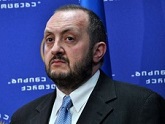
23 erano i candidati in lizza, ma di questi soltanto tre avevano vere chance. Ossia il filosofo 44enne Georgy Margvelashvili (rappresentante della coalizione Sogno georgiano ora al potere), l’ex speaker del Parlamento Nino Burjanadze (la “dama di ferro” della Rivoluzione delle rose del 2003 poi avversaria del capo di Stato uscente), il 41enne diplomatico David Bakradze (membro del Movimento Unito Nazionale di Saakashvili).
Ha vinto Margvelashvili con oltre il 62% delle preferenze, secondo è arrivato Bakradze con il 21, quindi la Burjanadze con un po’ più del 9% dei voti.
In campagna elettorale tutti i principali candidati avevano ribadito il corso di integrazione europea e nelle strutture dell’Alleanza atlantica intrapreso dal Paese caucasico, che, nell’agosto 2008, ha combattuto una disastrosa guerra contro la Russia in Ossezia meridionale.
“Maggioranza ed opposizione – ha sottolineato Margvelashvili – sono d’accordo sulla direzione fondamentale del nostro sviluppo e sugli obiettivi della nostra politica esterna nazionale”.
Il che potrebbe significare la firma del Patto di Associazione con l’Unione europea già il prossimo 28 novembre a Vilnius.
La Burjanadze è stata l’unica a mostrarsi più dubbiosa sull’integrazione nella Nato. “Fino a che vi saranno truppe russe sul nostro territorio – ha evidenziato l’ex speaker del Parlamento – ci sono poche possibilità di aderire all’Alleanza. Non ci sono stati passi politici effettivi per negoziare con Mosca”.
La Georgia è però un crocevia strategico fondamentale tra il mar Caspio ed i ricchi mercati occidentali. Da qui passano le principali pipeline tra Asia ed Europa. Ecco spiegata la grande attenzione prestata dalla comunità internazionale a queste elezioni.
Avendo già svolto due mandati presidenziali, il giovane carismatico leader georgiano, Michail Saakashvili, non ha potuto partecipare alla consultazione.
Con lui uscirà dalla vita politica attiva anche il suo principale avversario, l’attuale premier Bidzina Ivanishvili, che ha già annunciato le dimissioni per aver raggiunto i suoi obiettivi. Questo miliardario è infatti sceso in politica solo per dare al suo Paese un’alternativa al controverso Saakashvili, che ha dominato la scena nazionale dal 2003 con la Rivoluzione delle Rose, con cui di fatto spodestò dalla presidenza Eduard Shevardnadze, l’ex ministro degli Esteri di Gorbaciov.
Lo scorso anno ad ottobre il suo partito Sogno georgiano ha nettamente vinto le parlamentari, sconfiggendo duramente il movimento di Saakashvili.
“Per la prima volta – ha detto al suo seggio Ivanishvili – un candidato della compagine al potere non usa risorse amministrative per la sua campagna elettorale. Queste sono le prime elezioni di stampo europeo”.
Dopo l’uscita dei due grandi avversari la Georgia comunque cambierà. Entrerà in vigore la riforma costituzionale che la fa diventare una repubblica parlamentare. Il presidente rimarrà formalmente il capo dello Stato, manterrà ampio spazio decisionale nella politica estera, ma il governo ed il primo ministro acquisiranno maggiori poteri rispetto al passato.
Czech Social Democrats (ČSSD) won a slim victory in parliamentary election and face a tough task forming a government. A tiny 2 percentage point outcome over the new Ano party of billionaire Andrej Babiš and the inability to get more than 25 percent of the vote were a huge disappointment for party leader Bohuslav Sobotka.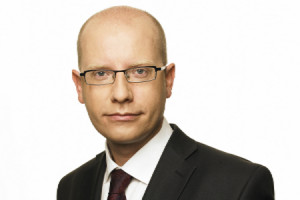
In third place was the Communists Party of Bohemia and Moravia (KSČM) with a strong showing that resulted in almost 15 percent of the vote.
The Civic Democratic Party (ODS), which has long dominated Czech politics, managed just 7.5 percent of the vote, a predictable outcome that pushes them to the fringes of Czech politics. The party’s downfall was largely due to the scandal that toppled the outgoing government.
The election result leaves the central European country of 10.5 million people facing the prospect of protracted political haggling and of another weak and unstable government just as the Czech economy emerges from a lengthy recession.
“If the lower house of parliament is fragmented, we will face tough negotiations on forming government,” said Sobotka. “The Social Democrats are prepared to take on this tough negotiation and we will try to form a reasonable, stable cabinet,” he said, adding he was ready to talk to all parties except the center-right parties who led the last government.
Election results
Social Democrats (ČSSD): 20.46%; 50 seats
Ano: 18.65%; 47 seats
Communists (KSČM): 14.91%; 33 seats
TOP 09: 11.99%; 26 seats
ODS: 7.72%; 16 seats
Dawn: 6.88%; 14 seats
Christian Democrats (KDU-ČSL): 6.77%; 14 seats
From The Prague Post and Reuters
Москва. Куда пропали дворники?
26 Oct 2013В Москве можно объявлять общегородской праздник.
Мечта расистов-националистов и, видимо, молчаливого большинства горожан начинает сбываться. 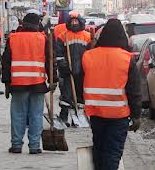
Процесс пошел даже раньше, чем я предполагал, и это не мои фантазии толераста, а подробный репортаж государственного агентства “РИА-Новости”. Посмотрите, чтобы четко понимать, что нас ждет дальше, и потом не стонать и не возмущаться.
В разных концах столицы москвичи, отмечающие многолетнюю добросовестность и доброжелательность гастарбайтеров, заметили, что те вдруг куда-то исчезли.
Дворы постепенно начинают зарастать бытовым мусором, который местные жители привычно бросают себе под ноги. Контейнеры также переполнены, их некому разгружать и вывозить.
Работодатели из коммунальных компаний боятся нанимать “черных”, и при массовых облавах и угрозах властей их можно понять. А тем временем в октябре традиционно формируются зимние (более многочисленные) бригады дворников, чтобы справляться не только с мусором, но и со снегом. Однако сейчас они не формируются по очевидным причинам.
Скоро зима.
Синоптики говорят, что холодная и с обильными осадками. Выводы и прогнозы можете сделать сами. От себя добавлю, что никакие белокурые дворники из таежной глубинки москвичей спасать не приедут, это чьи-то галлюциногенные фантазии (если называть вещи не своими, а более мягкими именами).
Впрочем, кажется, выход есть.
Предлагаю хозяевам московских коммунальных компаний организовать массовое трудоустройство дворниками нацистов на “русском марше” 4 ноября. Физически развитых, здоровых, готовых к тяжелому труду бездельников (простите, безработных) там будет много.
Очистим Москву!
Такой, кажется, у них лозунг?
Полностью его поддерживаю и одобряю. Русский националист, добившись изгнания “черножопых”, должен содержать свой город чистым. Уверен, что так оно и будет, и мы увидим тысячи скинхедов и сочувствующих им бытовых расистов во дворах с метлами и лопатами.
Возглавить массовое движение коренных жителей за очистку Москвы могут личным примером лидеры националистов, включая самого честного и некоррумпированного из них — единого безальтернативного лидера оппозиции.
Родина ждет героев, и она, конечно, дождется.
* * * Blog – Ayder Muzhdabaev – Айдер Муждабаев – Facebook –
Disappointment. This is Polish feeling for the ruling that the European Court of Human Rights is incompetent to judge whether Russia’s investigation into the 1940 Katyn killings of Polish war prisoners was insufficient.
Foreign Minister Radoslaw Sikorski said that the court’s Grand Chamber had “declined to give a clear judgement.” 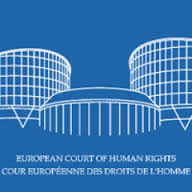
“Poles, including the Polish government, will not cease in their efforts to clarify all aspects of this heinous crime, while also striving for the full rehabilitation of the victims,” he insisted.
The process of rehabilitation is normally applied to those unjustly sentenced in court, and it would clear the victims of any stain on their honour under Russian law.
Sikorski noted nevertheless that the court had “clearly indicated that the Russian Federation did not provide this case and the court itself with sufficient cooperation.”
The court’s Grand Chamber had ruled that the adequacy of Russia‘s 1990-2004 investigation into the WWII massacres cannot be assessed, as the European Convention on Human Rights only came into force in Russia in 1998, eight years after Russia’s Katyn investigation began.
Polish foreign ministry issued an official statement, reiterating Sikorski’s comments, adding that Poland will also continue to demand that Moscow hands over all outstanding case files from its Katyn investigation.
The Katyn killings have been casting a shadow over relations between Poland and Russia for many years now, with Warsaw especially disappointed that Moscow was not willing to transfer documents concerning the massacre for further analysis.
The European court agreed that Russia had failed in this regard by refusing to submit a key procedural decision from the investigation and offered no substantive reason for maintaining its classified status.
From PAP – Radio Poland.
«Выключайте телевизоры!
И не дай бог оставить детей одних перед «волшебным ящиком». Как человек, смотрящий регулярно, но как бы со стороны, могу сказать: качество телепрограмм в России очень снизилось за последние годы, до такой степени, что скоро догонит низкий уровень ряда итальянских каналов… 
Эксперты подтверждают: если контролируешь федеральные телеканалы — страна у тебя в кармане. Понятно, какие личности и партии получили политическую выгоду от контроля телевидения в России за последние годы. Но я не хотел бы начинать здесь эту дискуссию. Важнее сосредоточиться на модели жизни общества, транслируемой телевидением.
С удивлением наблюдал по российскому федеральному каналу игровую программу, в которой принимали участие команды из разных стран. Мне показалось, что это не телеигра, а генеральная репетиция перед Олимпиадой. К счастью, российские команды почти всегда выигрывали, на арене развевались десятки национальных флагов, а зрители-фанаты под музыку кричали, как сектанты, каждую минуту: «Давай, давай, Россия!!!». Много раз замечал и другую странность. Когда ваши спортсмены побеждают на серьезных международных соревнованиях, они сразу становятся кумирами нации, и это правильно! Но если они вдруг не получают первого или хотя бы призового места, комментаторы стараются о них не вспоминать.
В большинстве российских домов телевизор постоянно включен. Мало кто ценит тишину и считает, что мозги должны отдыхать. Когда я появляюсь в России после долгого отсутствия, обычно мне достаточно поговорить с некоторыми телезависимыми друзьями, чтобы понять, сколь сильна была в прошедший период, например, националистическая пропаганда — с ее скрытыми подтекстами, а порой и открытыми лозунгами, полными ненависти против меньшинств и инакомыслия.
В последнее время она была очень сильна, поверьте. Поэтому я не удивился погромам в Москве, в районе Бирюлево… »
Статья – Джузеппе Д’Амато Московский Комсомолец Московский Комсомолец № 26360 Giuseppe D’Amato Moskovskij Komsomolets
Россия, как зарождается рейх.
20 Oct 2013 Теперь я очень хорошо понимаю, как зарождался третий германский рейх.
Как вдруг один приятель, добрый парень, интеллигент, выдавал в обычной беседе:
— Мне не нравится, как ведут себя эти евреи.
Некоторое время спустя констатировал:
— Нет, определенно, они меня бесят.
И наконец:
— Я ненавижу евреев! Пусть они исчезнут куда-нибудь!
Куда — это было уже не его заботой, к тому времени избавлением от чужих, выглядящих и ведущих себя не так, “захвативших всю торговлю в Германии”, занимались специальные люди — дружинники, активисты, позже подключилась полиция и т.д.
Евреи, цыгане, геи, душевнобольные… 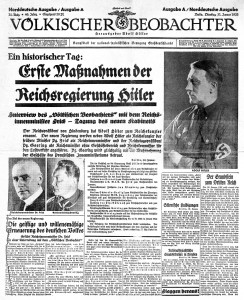
Все пошло своим чередом. А начиналось вот так — в простой, ничего не значащей беседе. Один сказал, другие промолчали. Кто-то поддакнул.
Недавно за столом одна знакомая изрекла, попивая кофе:
— Я ненавижу чеченцев.
Попробовал узнать, почему. Ответ:
— Просто ненавижу и все.
Это был не Аркадий Бабченко, который прошел две “чеченских войны”, но не пропитался ненавистью, сохранил и совесть, и честь, и доброту человеческую. Это была женщина средних лет, образованная. Она говорила это за кофе, не рискуя практически никем быть осужденной. Кроме меня, с ней, кажется, все были солидарны. Пусть молча, но считали это нормой — сказать, что ненавидишь чеченцев, доесть пироженку.
Один приятель, очень хороший парень (правда очень хороший), на днях пояснил, в какой стране мне придется жить:
— Мы построим русское православное государство.
— А как же конституция, светское многонациональное общество? И что мне тогда делать, — переспросил я, — брать дочек и уезжать?
Приятель ничего определенного не ответил, сам, наверное, еще не думал об этом. Да и ко мне, знаю, относится с уважением, может, не захотел обидеть. Но мысль такая, твердая, есть: русское, православное, иным прочим — неравные права.
После погрома с переворачиванием машин, унижением и битьем невинных людей просто, за внешность, вполне вменяемый человек пишет в Фейсбуке: “Чурки, так их!” Я его давно знаю, у него все в порядке с головой и с работой.
А девушка гуманитарного склада, умница, симпатяга, про кого бы никогда не подумал, считает, что громить “черных” — жестковато, конечно, но в принципе правильно, и надо продолжать ставить их на место, чтобы не зарывались. Кого — их? Кого и за что конкретно? Эти вопросы ее не занимают.
А бывший коллега, воспитанный, улыбчивый парень, вдруг поддерживает высказанную мной в виде сатиры идею полностью зачиститься от приезжих комментарием: “Я согласен!”. Не верю глазам, перечитываю фамилию — он.
А еще один…
Про тех, кто еще, боюсь, устану писать, а про некоторых и не хочу, надеясь, что брошенная фраза ненависти все же была случайной. Но факт есть факт: один за другим люди, которых я давно и хорошо знаю, люди моего круга, совершают в моих глазах националистический coming out. При этом сами не замечают — им кажется, что они похожим образом рассуждали всегда. Но я же помню их другими, я помню.
Или хочу помнить? Или не так хорошо их знал?
Нет, все-таки знал неплохо. Нет, никогда не жила в них эта странная, демонстративная ненависть. Возможно, они ведут себя так, чтобы встроиться в тренд, не нервировать самих себя, быть в ладу с окружающей действительностью.
И в ладу с большинством, если еще не участвующим в погромах, то уже находящим им нестыдное объяснение.
Мне трудно винить этих людей, многих я как любил, так и теперь пытаюсь. Но замечаю, что между нами растет стена. Да, это не стена гетто или концлагеря (впрочем, время покажет), но стена, точно отделяющая нас по принципу “свой-чужой” или “ты за этих или за наших?”.
И на самом деле вовсе не кучка бритоголовых наци — их-то легко рассеять, нетрудно посадить, — а именно это и есть настоящий, подрастающий в России фашизм. Свой, домашний, вполне удобоваримый. Презентабельный в обществе друзей и знакомых.
Фашизм, частью которого в повседневной жизни удобнее быть, чем не быть.
Blog – Ayder Muzhdabaev – Айдер Муждабаев – Facebook –
EU enlargement: priorities for 2014. Dossier.
19 Oct 2013 In a set of annual reports adopted, the European Commission recommends granting EU candidate status to Albania and, for the fifth time in a row, the opening of accession negotiations with the former Yugoslav Republic of Macedonia. The Commission also assesses the progress towards EU accession made elsewhere in the Western Balkans and in Turkey over the past year. Given the Icelandic government’s decision to put accession negotiations on hold, a simplified report on Iceland takes stock of the current state of its alignment with the EU. 
Presenting the annual Enlargement Package, Commissioner Štefan Füle said: ‘Enlargement is a process in the making and despite the economic crisis it is a good policy – it constitutes part of the solution.Enlargement continues to be one of the most effective EU policies. By addressing ‘fundamentals’ first – such as the fight against corruption, sound economic governance, freedom of expression and media, human rights and protection of minorities – it strengthens political and economic stability in the aspiring countries and the EU as a whole.”
The enlargement strategy adopted confirms the continued relevance of the fundamentals of the Copenhagen membership criteria agreed by the EU 20 years ago. These include the rule of law, which remains firmly anchored at the heart of the enlargement process. The countries concerned need to tackle issues such as judicial reform and the fight against organised crime and corruption early in the accession negotiations, to demonstrate a solid track record of sustainable results.
The global economic crisis has underlined the need for all countries to strengthen their economic governance and improve competitiveness. The Commission has set out a number of proposals to support this aim, including the introduction of national economic reform strategies and action plans for public financial management.
Recent events in a number of enlargement countries have underlined the importance of strengthening democratic institutions and making democratic processes more inclusive. All the countries in the Western Balkans and Turkey need to undertake further reforms to ensure that the principles of freedom of expression and the rights of persons belonging to minorities, including Roma are respected in practice. More robust measures are needed to protect other vulnerable groups from discrimination, in particular on grounds of sexual orientation. The Commission will increase the priority attached to these issues in the accession process, including through better targeted pre-accession funding and increased assistance to support Roma inclusion through a Roma “facility”.
Further information – European Union. Full Speech.
“Effective from October 7, Russia has banned the imports of Lithuanian dairy products. The Consumer Protection and Sanitary Inspectorate (Rospotrebnadzor) chief, Gennady Onishchenko, announced the ban…Moscow has not provided any evidence to substantiate its ostensible concerns about food safety…Russia resorts to trade warfare-type measures against neighboring countries (members as well as non-members of the European Union) periodically and selectively…
It is now targeting the European Union’s incumbent presiding country, Lithuania. It no longer bothers to answer Lithuanian and EU inquiries about the basis for complaints. On other fronts, Russia is currently imposing (and threatening to impose more) arbitrary restrictions on trade with the EU’s Eastern Partnership countries—Ukraine, Moldova and Georgia…These countries are set to conclude association, free-trade, and travel visa liberalization agreements with the EU at the Eastern Partnership’s summit on November 28–29 in Lithuania. The Kremlin seeks to derail that process… ”
Full Article – Vladimir Socor – The Lithuania Tribune.
Today we attended the Wilton Park conference, The Eastern Partnership: moving ahead, which included participants from across the EU and from Eastern Partner countries. The Eastern Partnership, with its focus on the future prosperity of Eastern Europe, is at the top of our agendas. Today’s discussion helped shape that future direction. 
On the 28-29 November, Lithuania will host the third Eastern Partnership Summit in Vilnius. This will be an important moment for the EU and Eastern Europe. The possibility of Ukraine signing its Association Agreement, including a Deep and Comprehensive Free Trade Area, and Moldova and Georgia initialing agreements, will be important milestones towards redefining and strengthening the EU’s relationship with our Eastern European partners.
Eastern partners have already made significant irreversible and sustainable political and economic reforms, which will benefit their citizens. As they continue to grow they need to continue to implement further reforms. Liberalised economies, open and inclusive politics, and respect for the rule of law are all key building blocks for prosperity in the EU from which our eastern partners and others can benefit. We are ready to support partner countries in their efforts to implement reforms and the Association Agreements.
As we look towards the future we hope to see an Eastern Partnership that supports those seeking an ever closer relationship with the EU, and for some eventual EU membership, that supports open economic polices, inclusive democracy and that sustains respect for the rule of law, and we will do all that we can to ensure it.
Linas Linkevičius, Minister of Foreign Affairs of the Republic of Lithuania
Radosław Sikorski, Minister of Foreign Affairs of the Republic of Poland
David Lidington, Minister of State, Foreign and Commonwealth Office, United Kingdom
London – 14 October 2013
Очередная национальная идея России не работает.
16 Oct 2013«Недавно общался с лесбиянкой из так называемой российской глубинки. Умная, веселая девушка — точнее, еще девочка, ей 13 лет. Пишет стихи…Она любит другую девушку, которой уже 18…Как все влюбленные девочки, мечтает о семье и о детях… недавно сам Президент РФ поставил сторонников однополых браков на место. «Проводится политика, — говорил Владимир Путин о развратном Западе, — ставящая на один уровень многодетную семью и однополое партнерство, веру в Бога и веру в сатану»… Материализм, эгоизм, цинизм, марафонские забеги «налево», нежелание иметь детей — конечно, все эти современные прелести присутствуют и на Западе. Но все-таки смешно, когда представители чемпиона мира по разводам (РФ) объясняют остальным, как строить здоровую семейную жизнь…
Пишет стихи…Она любит другую девушку, которой уже 18…Как все влюбленные девочки, мечтает о семье и о детях… недавно сам Президент РФ поставил сторонников однополых браков на место. «Проводится политика, — говорил Владимир Путин о развратном Западе, — ставящая на один уровень многодетную семью и однополое партнерство, веру в Бога и веру в сатану»… Материализм, эгоизм, цинизм, марафонские забеги «налево», нежелание иметь детей — конечно, все эти современные прелести присутствуют и на Западе. Но все-таки смешно, когда представители чемпиона мира по разводам (РФ) объясняют остальным, как строить здоровую семейную жизнь…
Другие европейские общества пытаются решать свои социальные проблемы «внутри избы». А Россия валит и плохую погоду на секретное сейсмическое оружие недругов (так говорит вице-спикер вашей Госдумы), и обсуждение собственной демографической катастрофы превращает в пафосную пропаганду против секс-меньшинств как «пятой колонны» вечно разлагающегося Запада… »
Статья – – Штефан Шолль – Московский Комсомолец № 26358 от 14 октября 2013 г. Stefan Scholl Moskovskij Komsomolets
Welcome
We are a group of long experienced European journalists and intellectuals interested in international politics and culture. We would like to exchange our opinion on new Europe and Russia.
Categories
- Breaking News (11)
- CIS (129)
- Climate (2)
- Energy&Economy (115)
- EU Eastern Dimension (85)
- Euro 2012 – Sochi 2014 – World Cup 2018, Sport (43)
- Euro-Integration (135)
- History Culture (198)
- International Policy (261)
- Military (74)
- Interviews (18)
- Italy – Italia – Suisse (47)
- Odd Enough (10)
- Poland and Baltic States (126)
- Religion (31)
- Russia (421)
- Survey (4)
- Turning points (4)
- Ukraine (176)
- Российские страницы (113)
Archives
- November 2020
- October 2020
- September 2020
- August 2020
- July 2020
- May 2020
- April 2020
- March 2020
- January 2020
- December 2019
- November 2019
- October 2019
- September 2019
- August 2019
- July 2019
- June 2019
- May 2019
- April 2019
- March 2019
- February 2019
- December 2018
- November 2018
- October 2018
- September 2018
- August 2018
- July 2018
- June 2018
- May 2018
- April 2018
- March 2018
- February 2018
- January 2018
- December 2017
- November 2017
- October 2017
- September 2017
- August 2017
- July 2017
- May 2017
- March 2017
- January 2017
- December 2016
- November 2016
- October 2016
- September 2016
- July 2016
- June 2016
- May 2016
- April 2016
- February 2016
- January 2016
- November 2015
- October 2015
- September 2015
- June 2015
- April 2015
- March 2015
- February 2015
- January 2015
- December 2014
- November 2014
- October 2014
- September 2014
- August 2014
- July 2014
- June 2014
- May 2014
- April 2014
- March 2014
- February 2014
- January 2014
- December 2013
- November 2013
- October 2013
- September 2013
- August 2013
- July 2013
- June 2013
- May 2013
- April 2013
- March 2013
- February 2013
- January 2013
- December 2012
- November 2012
- October 2012
- September 2012
- August 2012
- July 2012
- June 2012
- May 2012
- April 2012
- March 2012
- February 2012
- January 2012
- December 2011
- November 2011
- October 2011
- September 2011
- August 2011
- July 2011
- June 2011
- May 2011
- April 2011
- March 2011
- February 2011
- January 2011
- December 2010
- November 2010
- October 2010
- September 2010
- August 2010
- July 2010
- June 2010
- May 2010
- April 2010
- March 2010
- February 2010
- January 2010
- December 2009
- November 2009
- October 2009
- September 2009
- August 2009
Our books




